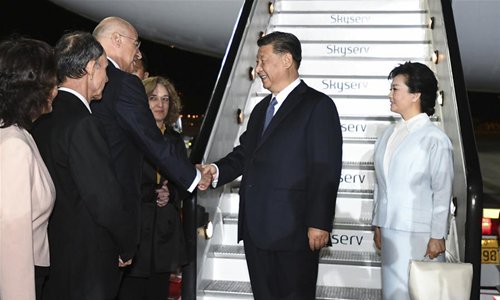HOME >> OPINION
Xi’s visit can propel Greece’s role in BRI
By Shi Zhiqin Source:Global Times Published: 2019/11/11 20:23:40

Chinese President Xi Jinping and his wife Peng Liyuan are greeted by senior Greek officials upon their arrival at the airport in Athens, Greece, on Sunday. Xi arrived in Greece for a three-day state visit to consolidate traditional friendship and strengthen cooperation between the two countries. Photo: Xinhua
Chinese President Xi Jinping landed in Greece on Sunday, starting his three-day visit to this European country.Linked by the Silk Road, China and Greece have had profound cultural ties since ancient times. The Silk Road is not only about business but also focuses on bridging Eastern and Western civilizations. As the two countries have been jointly developing the Belt and Road Initiative (BRI), they have promoted dialogue between different civilizations and deepened cooperation in various fields, setting an example of peaceful coexistence and win-win cooperation for other countries.
Exactly as Greek Prime Minister Kyriakos Mitsotakis said in his speech at a business forum entitled "New era of opportunity, Greek-Chinese partnerships" in East China's Shanghai on November 4, "There is no better time to write a new chapter in Greek-Chinese relations."
As two ancient civilizations, China and Greece have learned from each other and reduced misunderstandings through dialogues, which is important amid the new global order.
Based on culture, the two countries have deepened exchanges in fields including opera, literature and museum. People-to-people contacts are becoming an important engine of China-Greece relations in addition to improving economic and trade relations.
Since establishing diplomatic relations in 1972, China and Greece have maintained traditional friendship. Bilateral cooperation has expanded since the two countries established a comprehensive strategic partnership in 2006. The two sides signed a memorandum of understanding in 2018 to further cooperate within the BRI framework, making Greece the first developed Western country and among the first EU nations to sign an intergovernmental cooperation document with China to jointly advance BRI cooperation. Under the BRI, relations have been witness to frequent high-level exchanges and continuous deepening of political trust.
In April, the Mediterranean country officially joined the "16+1 Cooperation," a mechanism between China and Central and Eastern European Countries (CEEC), which further enriches the scope of China-CEEC cooperation. The mechanism of "16+1 Cooperation" has evolved into "17+1 Cooperation." Ties between China and Greece have set an example of peaceful coexistence and win-win cooperation among countries with different systems, cultures and size.
As ancient civilizations, China and Greece possess a natural affinity. Peoples of the two ancient countries trust and respect each other, consolidate the foundation of bilateral cooperation in areas of policies, economy and trade - increasing people-to-people contacts, reinforcing mutual political trust and deepening economic and trade cooperation. With the rapid development of ties with China and an elevated international status and influence, the Mediterranean country will play a more proactive role in BRI development.
According to the Ministry of Commerce of China, the trade volume between China and Greece reached $7.06 billion in 2018 and was $6.35 billion from January to September this year, increasing 21.4 percent year-on-year.
The China Ocean Shipping Company (COSCO)'s investment in the Port of Piraeus is a model project of the BRI, and also an epitome of cooperation between China and Europe under the initiative. Since COSCO took over the Piraeus Port, development at the facility has leapfrogged with container throughput and profits reaching a new high.
The project created more than 3,000 direct and over 10,000 indirect jobs, making the port the largest one in the Mediterranean Sea region, and bringing tangible benefits to the local and Greek economy.
Within the BRI framework, the two countries should make full use of the open and pragmatic platform of the "17+1 cooperation" mechanism to boost the flagship role of the Piraeus Port.
The author is executive dean of the Belt & Road Initiative Institute and vice chairman of the Center for China-EU Relations at Tsinghua University. opinion@globaltimes.com.cn
Posted in: VIEWPOINT